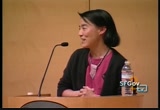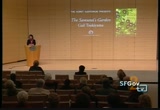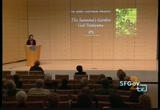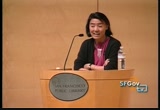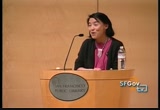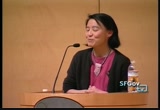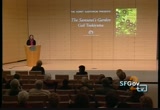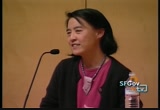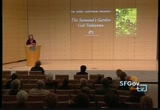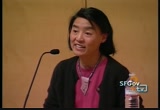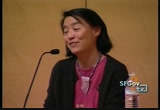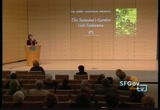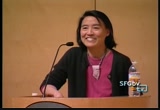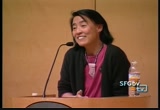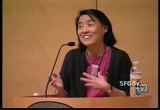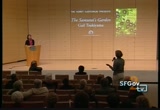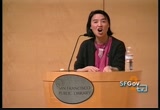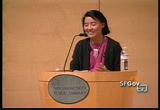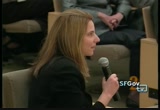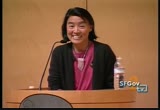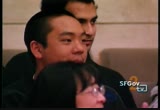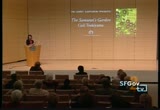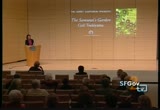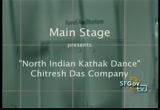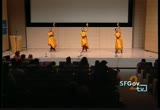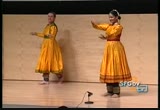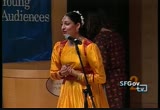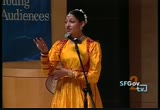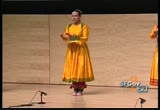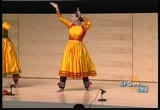tv [untitled] November 16, 2012 2:00am-2:30am PST
2:00 am
one of the brothers becomes an sumo and that's why it's a big book! [laughter]. >> do you think that -- being a woman who is in women have been oppressed -- i don't know if they are now or not, dou think that has stimulated you in your writing coming out of that? you specifically and in general, do you feel like a lot of women have been stimulated by being part of an oppressed class? >> good question. >> very much so. i will try to answer a, b, c. for me, i know that the first thing i began to think about
2:01 am
when i thought i wanted to write a novel was that i wanted to write about my culture. and because i had grownup in the chinese culture i wanted to write about china. i wanted to find out more about myself because of i was raised in the bay area and because i didn't know culturally a lot of things i wanted to know. i knew i wasn't going to write about myself and knew that i was not going to write about my family. but i wanted to write about an aspect about china and women. those were the 2 things i knew when i began the first book. i was fortunate enough to it stumble upon the silk working women which gave me everything i wanted. it gave me the culture. it gave me a sense of what it meant to be a female chinese women in that time and a sense of empowerment on what they had
2:02 am
done. regardless of what they understood they were doing at the time. they didn't know it was a culture that was earning money and living independent of husbands and family that was doing everything against what it meant to be in the chinese culture. i hadn't heard about that and it was perfect. it was exactly what i was looking for. i can go off and preach about the fact they think so many of us asian american authors and asian authors in general tend to go back and write about our ancestors and write about things in our past not our specific past but may be of of ancestors and mothers and grand mothers. we have been telling their story. i think the generation to come, will be telling stories of living here. it will be different stories. but the oppression of our voices
2:03 am
have been for so many, many years, if you think back the first writer who was read in terms of asian american was maxine kingston. i read her in high school and was greatly affected by reading about the woman warrior. before her there were few. there were some but didn't make that economic splash. they were never read in a large way. maxine was the first one we read her in school we knew of her. she was not out there like anny tan was when she wrote the joy luck club. so much of it is timing. it meant all the history and the voices before then had been silent. my generation of writers came in and we heard stories of women
2:04 am
and men and the family of a different generation. a lot of us had been writing about that because they were silenced for so long. i am involved with the book prize. it's a pacific rim book prize in which books come from asia and all over the pacific rim. in the last 11 years it's been a prize we read so many books that have come from voices of new writers. i'm always amazed and they are writing different storers i wrote when i started. all the people have come through now. if you look at the list of indian and japanese authors and chinese authors it's now we are very much diverse. i think for a long time we weren't. i thank you for that question. if i keep going i will never get
2:05 am
another question. [laughter]. >> thank you for samurai's garden. i read it had it first came out and it's wonderful to be rereminded. >> thank you. and thank you for coming. you know jump off, i was samurai's garden, i said it was an energizer bunny. danville shoes samurai's garden the end of last year. they had the danville theatre which is a nice theatre and they were doing roamioand juliette and there was me in the middle of a balcony. it was a nice audience when i
2:06 am
walked in my brain was exat that timic, look at the people here. it's almost as good as last years. i said who did you choose last year. and the year before. and told me. i said do you realize they are dead already? >> i'm alive and shouldn't i pull in a little more? [laughter] to go off, thank you for coming. >> my pleasure. i just this month read your book dreaming water. and i was -- i'm very glad to have read it. i'm wondering 2 things. there seems to be more of an advocacy voice in terms of the
2:07 am
discrimination of being you know an asian american. and secondly, warner's disease. i'm wondering how you got into writing about that? and the characters were wonderful. >> okay. your first question, first. you know to be totally honest, when i sat down to write dreaming water i thought this is the book that -- i had finished language of threads and written 4 books that took place in asia. because language of threads was a hate this word, the seekial to women of the silk i felt i came full circle and my asia period might have been done i wanted to write a book that was
2:08 am
contemporary and set in california. i knew i wanted to write a mother daughter story line. that's what i began with. it was the first time i said, this character not necessarily has to be asian. none of these characters necessarily have to be asian. i was of mind opposite of what you are saying happened through the book. what happened was the more i started to research when i discovered warner's, ime wantedo write. i was feeling older as a person and wanted to translate that into a book. when i thought i would write about the care taking situation and wanted to write about a mother and daughter and i thought was there an aging disease? where children grow old quickly. by the time they are 7 or 8 they
2:09 am
look like little old people because they age so quickly. the first thing i asked myself is there a version of this disease for older people. does it start later in a person's life? as i'm researching i discover warner's syndrome and that's how it came to be that particular disease in the book. i thought this works because she would have a life before the disease started to age her in the 20's as opposed to being very young. more i researched the more i realized that a large population of japanese people seemed to have this genetic defect. it brought me back to the japanese culture even though i was not looking for it. what happened was if she was half japanese. here again you will hear the writing process.
2:10 am
as i'm thinking about this and thinking about story line and her parents. if her mother is italian and her father is japanese which would make her half and half the genetic defect would come to the father then things would have to happen if they grew up in california. he grew up in pasadena which means he would be inturned. things start to happen without you looking at it from the beginning when writing a story but as you develop the characters and the year and the situation and the stories a father would tell a daughter. all this came out the camps, what happened. what he hoped for. what he wished for. all the stories he tells the daughters. some of them would have to cover that interment time and a lot is what happened from my research. all that went in the book.
2:11 am
does that answer your question? it's not that i purposely said, now i will advocate this. but if a story line covers a certain aspect of history that you tell it to the greatest truth you can. you know, you talk about the situation and if you inhabit the characters, hopefully, in the right way you try to feel hathey would feel. >> thank you. >> we started reading your book in my classroom a couple of weeks ago. >> he's lifting the book up. they are disapointed because we haven't gotten to the part you read yet, it's okay the story is not spoiled. i want to thank bobby and alex for coming on a school night. i want to thank you, too. >> you are welcome. >> [laughter]. >> one of the things the book has done is opened their eyes to japan and japanese culture which
2:12 am
is new to a lot of them. what are some of the more important aspects of japanese culture that you would want us to take away reading this book? we are fixated on figuring out who the samurai is we have ideas and we are trying to deconstruct the attributes of a samurai. in your opinion what would be useful for us to think about or focus on as we finish the book. we are a third of the way through it. >> one of those kind of questions [laughter]. i will tell you about an e mail i got this entire high school on the east coast is reading the samurai's garden. i started to get 30 e mails. they discovered through the website an e mail which would come directly tow me. i started to figure it out when all the questions were the same. they -- it was the questions which they had to write their
2:13 am
essay on. one young woman wrote me and said, i don't know if i have time to read the book can you tell me who the samurai is and where the garredin is? [laughter]. i thought these kids are going to be okay. you know this is our generation coming up. i wrote her and said, you know, read the book. i think for me, because i think every book is a learning process for me. in terms of my culture because i am the first, i don't know about all that needs to be known of both being chinese and of course being japanese. i get a lot wrong. i cringe when i pronounce a japanese word because i know i'm not say itting correctly. i can get away with it. here i don't know, it's harder to get away with it in the bay area because we are such a melting pot.
2:14 am
and so many people who know japanese where i don't. what i discovered i think on the whole, for all cultures both cultures and the writing process itself is the more i write about different cultures the more i realize how much alike we are. and if you take anything away take that. take the fact that all humanity is the same. you know the -- culturesar a background for me it makes you who you are. if you are japanese you bow. if you are chinese you don't. there are certain things that are specific to each culture. but if you are writing characters there are specific things that are everybody. and that's more important to me in that sense. you have the culture's background but if you can understand why a person who lives in that culture feels the way they do or does what they do i think that's the most important thing. does that answer your question?
2:15 am
>> yeah. >> thank you. >> you letting me off? [laughter] do i have another story to tell you? i would if i -- >> you seem very conscious of the writer's process you are aware of how you work. you mentioned you changed from a film major to an english major. can you talk about when you were conscious when you wanted to be a writer. >> as opposed to a film maker? >> yes. >> some writers are not aware of their process as you are and i'm fas nacinated by that. >> when i took my first film class it was so boring. and it had nothing to do about
2:16 am
the story that i was watching on the screen. and everything to do about how many frames per second or per minute or whatever it was. i thought, this is not at all what i thought it would be. then i moved from you know, to the technical aspect film writing course i took. it felt technical because i felt i had to be aware of the camera angles. literally aware it had to go down longshot or closeup and it was interfering with the story line. i graduated from san francisco state and it was creative writing within the english department. i was taking a class much like this. writers on writing and a writer came to speak to a group of young writers the first writer who came was a poet. and i was i fell madly in love with language.
2:17 am
i think that's why i'm probably conscious with the writing process because i began with the foundation of language, which is poetry for me. it made me aware of how to use language. not to over use language. you know things like that that aspects of it. i talk a lot about the writing process for a lot of reasons because i think that if you tell what it really means to be a writer people will think oh , it's not -- i think to a large extent you all think we run with the bulls. you know and you think we are sitting in cafes and i can never write in a cafe because i would watch people too much. how can you sit in a cafe and write a novel? we all have our process. i think the interesting things to talk about is the process how you do it because we all do it differently. i don't run with the bulls or
2:18 am
sit in cafes. this is the way i do it. there are many ways to do it and you have to find your own way. >> around the web i googled through me to see what it looked like i saw the big bridge and it looked industrialized. >> there really is love. >> i did. a real place and how you pick the location. i have family in japan and my kids are are in a bilingual program in san francisco that's japanese. >> i bet she speaks japanese better than i do. my kids might not me. >> when i had the gun i knew there was a [inaudible] and i started writing down things and i thought in my mind's eye, i think it looks like this. and it would be like that i had a small village in mind. there was a part in time i thought, i could go back to
2:19 am
japan and go there and see how it looked. i had in the book and in my heart what i thought it was, i almost knew that if i had gone back it wouldn't be the same. so i made the conscious choice of not going. now that you tell me this i'm thankful i didn't i think it would have destroyed what i created in my head. i thought places are best when they are imagined. i hesitated naming it after a place where my mom said what did exist. i'm glad i didn't go back. making that conscious choice would have changed had i gone back would have changed the direction of the book a lot. >> when i saw it it was so different than how an imagined from reading your books. >> does that teach you never to
2:20 am
look up things. always listen to the writer? [laughter]. >> we have time for one more question. >> can't be our essay question. >> she didn't give us a question yet. i wanted to know what made you think of the title like the samurai's garden? >> oh , know the title story. >> i'm sorry. >> quickly. this is actually a publishing business thing. i had written on the contract because i was reading about samurais and gardens. at the time the contract. i looked and said, oh , the samurai's garden. now they would put untitled. i put dount samurai's garden not thinking that would really with the title. and what happened was when it was time to choose a title my
2:21 am
editor had a god awful title she felt was the most brilliant title since the grapes of wrath. it was like this long and everything was in it but the kitchen sink. love, samurai, garden and sushi. it was a terrible title and i didn't like it and i didn't know what to say i had never disagreed. that was the first time i disagree. i said i don't want to look at my book case and see that book and cringe in 30 years. she called me from new york and said, i don't know why we are going over the title thing let's keep it the samurai's garden. then i was saying, thank you, god and it became the samurai a garden which in the end worked when you decide hathat samurai
2:22 am
is in your class you will see how it works. it works in many, many ways. i'm pleased it stayed the samurai's garden. not of anybody's choice but because it was the one we didn't want to fight over anymore. >> okay. >> [laughter]. >> thank you. i >> i think you wanted something else. >> well, i met the samurai and [laughter] >> thank you. >> thank you, gale so much for coming. >> [applause]. thank you.
2:26 am
good afternoon, everybody. thank you for joining us today. the first thing i will ask you to do is put your hands together in front of our heart and bow slightly and say nanasta it means the good in me greets the good in all of you. who knows where is this is from? india. today we are sharing an form. we are members of the dance company based here in san francisco and we are taught by somebody who has been doing this art form for over 50 years much the ladies including myself we
2:27 am
have been studying with him for a long time. you will see different things. lots of sounds with our feet. a little bit of story telling through mime and expression and you will learn about math in dance. who would have thought. today we will start, our next piece means the coloring of the stage. dancers show the hindu aspect of the dance by using the positions of our hands we will show you we are decorating the stage and make a water picture and cleaning the stage with the water. plucking flowers and decorating the stage with the petals of the flowers. we will awaken the 5 senses through the blowing of a conch shell. we will demonstrate the 3 duty,
77 Views
IN COLLECTIONS
SFGTV2: San Francisco Government Television Television Archive
Television Archive  Television Archive News Search Service
Television Archive News Search Service 
Uploaded by TV Archive on

 Live Music Archive
Live Music Archive Librivox Free Audio
Librivox Free Audio Metropolitan Museum
Metropolitan Museum Cleveland Museum of Art
Cleveland Museum of Art Internet Arcade
Internet Arcade Console Living Room
Console Living Room Books to Borrow
Books to Borrow Open Library
Open Library TV News
TV News Understanding 9/11
Understanding 9/11